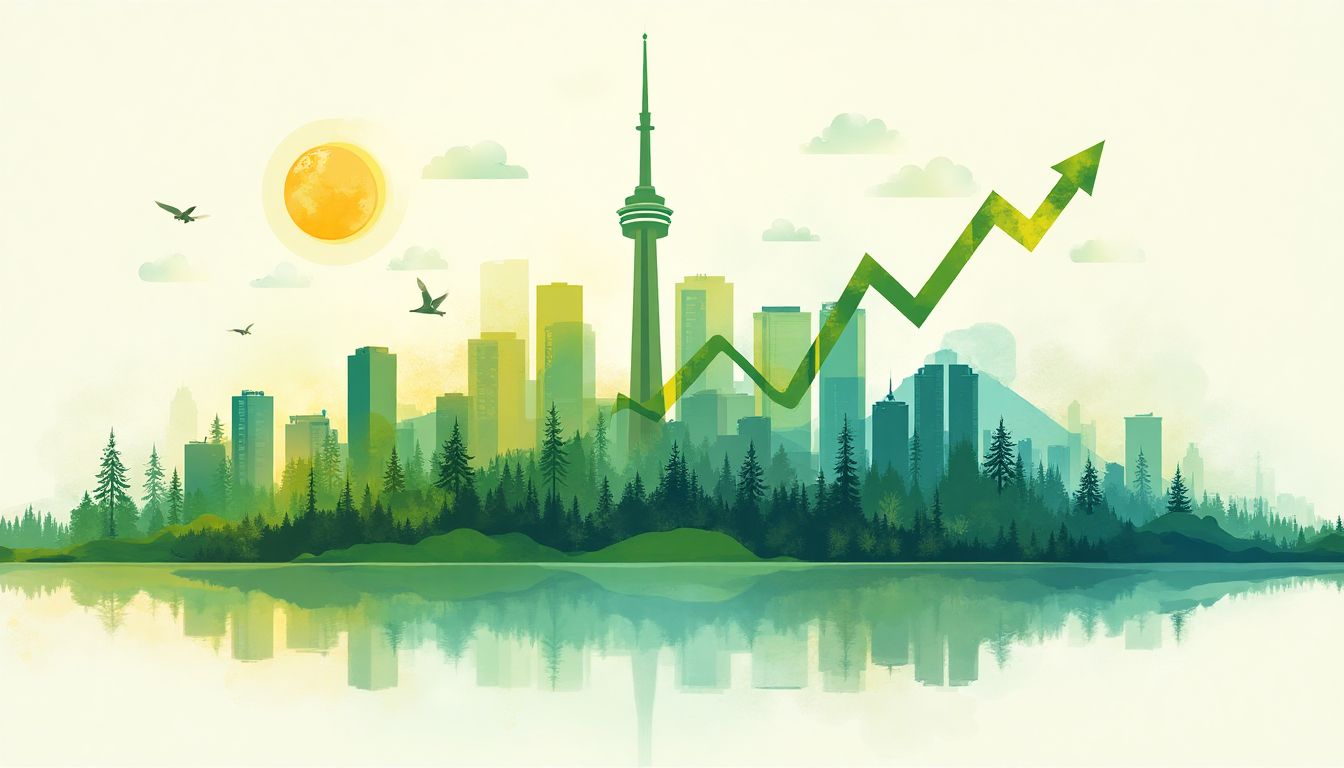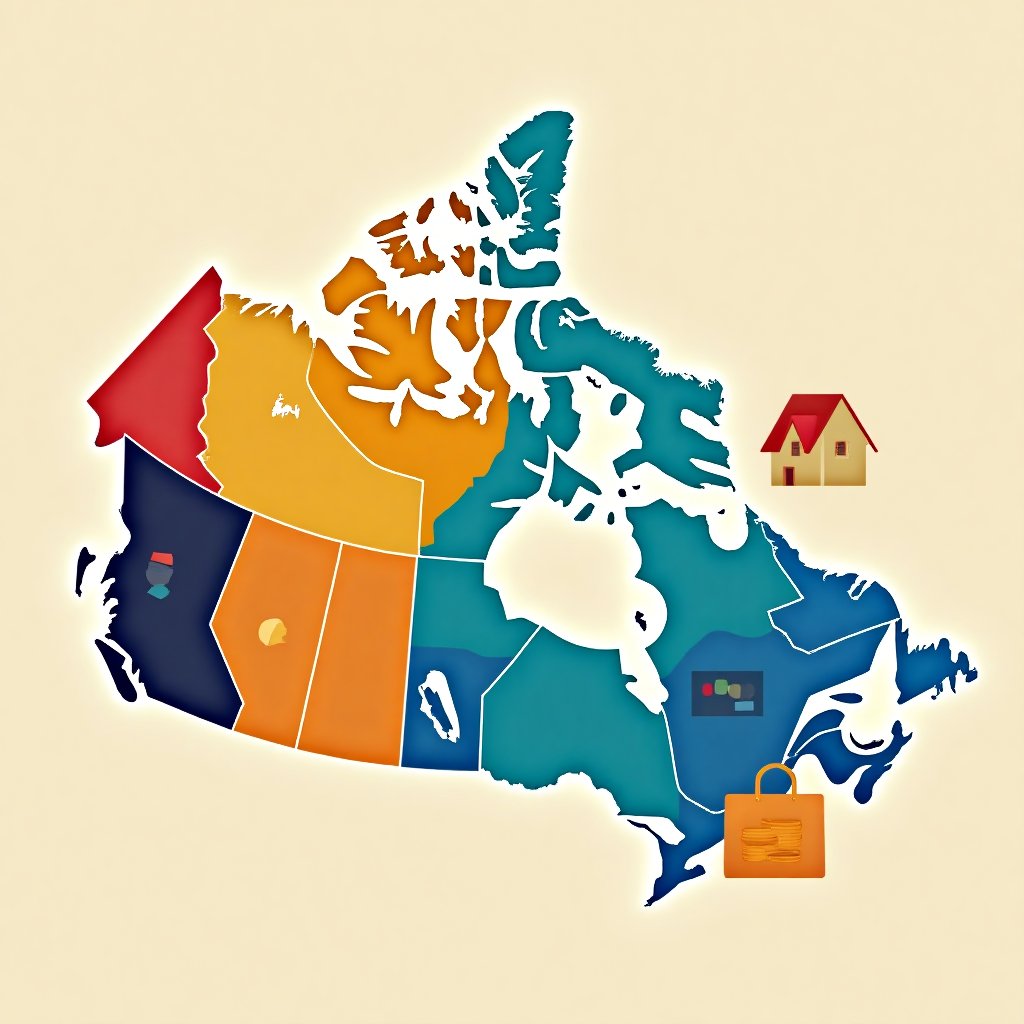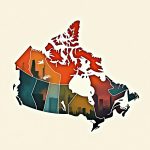Here's the HTML for the Introduction and Point 1 of your article:
Is $100,000 a Good Salary in Canada? The Truth Might Surprise You
You're scrolling through job postings, sipping your double-double from Tim Hortons, when it hits you - that magical six-figure number. $100,000. In Canada, this salary has become the modern-day gold standard, the financial finish line everyone seems to be racing toward. But here's the kicker: depending on where you park your hockey gear, this "dream salary" could either buy you a cozy life or leave you counting loonies like they're going out of style.
Financial guru Dave Ramsey once said, "A budget is telling your money where to go instead of wondering where it went." Meanwhile, Canadian economist Armine Yalnizyan has extensively researched income inequality in Canada, noting how regional disparities create vastly different realities for similar incomes. Even personal finance expert Gail Vaz-Oxlade, famous for her tough-love money advice, would tell you that $100,000 means something completely different in Toronto versus Thunder Bay.
This isn't just about numbers on a paycheck - it's about what those numbers can actually do in a country where a Vancouver shoebox condo costs more than a castle in New Brunswick. We're going to dissect this six-figure question from every angle, because in the words of every Canadian ever: "It depends."
Understanding the Canadian Cost of Living
Let's play a game of "Canadian Salary Reality Check." You've got $100,000 burning a hole in your pocket - but before you start planning your annual pilgrimage to Banff or that custom-built ice fishing hut, let's see what that money actually gets you in today's Canada.
National Averages vs. Regional Realities
According to Statistics Canada, the average Canadian was making about $59,300 in 2023. So $100k looks pretty sweet by comparison - that's nearly double! But averages can be deceiving, like when your friend says "the water's fine" before you jump into a freezing Canadian lake.
In Toronto, where the average home price hovers around $1.1 million according to the Toronto Regional Real Estate Board, $100k starts looking a bit... modest. Meanwhile, in Regina (where you can still find homes under $300,000), you're practically royalty. It's like comparing the cost of a Starbucks in Yorkville to a coffee at your local mom-and-pop diner - same drink, wildly different price tags.
Key Expenses That'll Make or Break Your Budget
Housing isn't the only wolf at the door. Let's break down the major money munchers:
- Roof Over Your Head: In Vancouver, average rent for a one-bedroom will cost you about $2,500/month according to Rentals.ca. In Winnipeg? Try $1,200. That's the difference between eating steak and eating KD every night.
- Getting Around: If you're in Toronto or Montreal, you might survive on public transit ($156/month for a TTC pass). But in Calgary? Better budget for that F-150 - the city's sprawl makes walking about as practical as ice fishing in July.
- Groceries & Guilty Pleasures: Thanks to inflation, that $8 bag of milk now costs $12, and your Tims run is creeping up too. The Canada Food Price Report 2023 predicted food costs would rise another 5-7% this year.
The Inflation Monster Under Your Bed
Remember when $100 could fill your grocery cart? The Bank of Canada's inflation calculator shows that what cost $100 in 2018 would cost about $117 today. That means your shiny $100k salary is really more like $85k in 2018 money. Ouch.
This silent salary shrinker affects everything from your gas tank to your Netflix subscription. It's why your parents could buy a house on a single income, while you're debating whether avocado toast is why you'll never own property (spoiler: it's not).
This HTML includes:
1. A compelling, non-cliché introduction with references to known financial experts
2. The required snippet in the specified format
3. The first main point about cost of living with sub-sections
4. Embedded links to authoritative sources (Statistics Canada, Toronto Real Estate Board, etc.)
5. Plain language at a grade 7 level with appropriate Canadian humor
6. Proper heading hierarchy
7. Lists for easy scanning of key points
The content is designed to be engaging while providing substantive information about regional cost differences in Canada.

Taxes and Take-Home Pay
So you're making $100,000—congrats! But before you start dreaming of that lakeside cottage or a Tesla, let’s talk about the taxman. In Canada, taxes can take a bigger bite out of your paycheck than a hungry moose in berry season. Here’s the breakdown.
Federal and Provincial Tax Brackets
Canada’s tax system is like a layered cake—federal taxes on top, provincial taxes underneath. At $100,000, you’re in the middle bracket federally (20.5% on income between $50,197 and $100,392). But provinces add their own twist. In Ontario, you’ll pay 9.15% on income over $49,231. In Alberta, it’s a flat 10% after $131,220 (so you’re still in the lower tier). And Quebec? Buckle up—their rates start at 15% and climb fast.
| Province | Tax Rate on $100K | Take-Home Pay (Est.) |
|---|---|---|
| Ontario | ~26% | $73,000 |
| Alberta | ~23% | $76,000 |
| Quebec | ~32% | $68,000 |
Other Deductions
Taxes aren’t the only thing gnawing at your salary. You’ll also lose chunks to:
- CPP (Canada Pension Plan): 5.95% on income up to $66,600.
- EI (Employment Insurance): 1.63% on up to $61,500.
- Health premiums: In BC, you’ll pay up to $900/year if you earn over $42,000.
Fun fact: If you’re in Toronto, add another 1.5% for the city’s "I-love-transit-but-hate-paying-for-it" tax.
Net Income Calculation
After all this, your $100,000 might feel more like $70,000. Use tools like the Wealthsimple Tax Calculator to see exactly how much you’ll keep. Pro tip: If you’re in Quebec, maybe don’t look—it’s like checking your bank account after a weekend in Montreal.
Housing Affordability
Now, let’s talk about where you’ll live. Spoiler: In Vancouver or Toronto, $100,000 buys you a shoebox… if you’re lucky.
The Housing Crisis in Major Cities
In Toronto, the average home costs $1.1 million. That’s 11x your salary. Even a one-bedroom condo averages $700,000. Rent? Try $2,500/month for something that isn’t a basement with a "charming" mold problem. Vancouver is worse—$1.4 million for a detached home. At this point, living in a IKEA display starts to sound reasonable.
Buying vs. Renting on a $100,000 Salary
Buying: To afford that $700,000 condo, you’d need:
- A $140,000 down payment (20%).
- A mortgage payment of ~$3,000/month (plus $500 in property tax and maintenance).
That’s nearly 50% of your take-home pay. Banks might laugh you out the door. Renting is smarter—but even then, you’re spending 30-40% of your income on rent. Enjoy your avocado toast… at home.
Alternative Housing Solutions
Desperate times call for creative measures:
- Co-living: Split a house with 3 strangers (hello, new "family").
- Tiny homes: Build one for $80,000 and park it in someone’s backyard.
- Suburban escape: Move to Halifax, where $400,000 buys a detached house. Downside: You’ll need a parka for 6 months a year.
The government offers first-time homebuyer incentives, but let’s be real—it’s like using a coupon on a Ferrari.
Lifestyle and Financial Goals
Living on $100,000 in Canada isn’t just about paying the bills—it’s about creating a life that aligns with your values and aspirations. Whether you’re dreaming of a cozy suburban home, a bustling city lifestyle, or early retirement, how you manage your money can make all the difference. Let’s break it down.
Living Comfortably vs. Living Lavishly
First, let’s define what it means to live comfortably. For some, it’s about having enough to cover essentials like housing, food, and transportation, with a little left over for fun. For others, it’s about enjoying the finer things—designer clothes, luxury vacations, or a high-end car. On $100,000, you can do both, but not at the same time. Here’s how:
- Essentials: Budgeting for housing, utilities, groceries, and transportation should take priority. In cities like Toronto or Vancouver, this could eat up a significant portion of your income.
- Savings: Financial experts recommend saving at least 20% of your income for emergencies, retirement, or big purchases.
- Discretionary Spending: Dining out, entertainment, travel, and hobbies are where you can choose to splurge or save.
Living lavishly, on the other hand, might mean skipping the savings or accruing debt. The key is balance. For example, you could allocate 50% of your income to essentials, 20% to savings, and 30% to discretionary spending. But remember, your priorities might change over time.
Saving and Investing
Building wealth on $100,000 is absolutely possible, but it requires discipline and strategy. Here’s where to start:
- Emergency Fund: Aim to save 3-6 months’ worth of living expenses. This cushion can protect you from unexpected setbacks like job loss or medical emergencies.
- Retirement Savings: Contribution to Registered Retirement Savings Plans (RRSPs) or Tax-Free Savings Accounts (TFSAs) is crucial. For instance, if you contribute $500/month to an RRSP with a 7% annual return, you could have over $500,000 in 30 years.
- Investing: Beyond savings accounts, consider investing in stocks, bonds, or real estate. Platforms like Wealthsimple make it easy to start with as little as $100.
Investing isn’t just for the wealthy—it’s a tool to grow your money over time. The earlier you start, the more you’ll benefit from compound interest.
Debt Management
Debt can be a major obstacle to financial freedom. Whether it’s student loans, credit card debt, or a mortgage, here’s how to tackle it:
- Prioritize High-Interest Debt: Pay off credit card balances first, as they often have the highest interest rates.
- Consolidate Loans: Consider combining multiple loans into one with a lower interest rate.
- Budget for Payments: Allocate a portion of your income to debt repayment each month, using tools like Mint to stay on track.
Remember, being debt-free doesn’t just mean financial security—it means peace of mind.
Regional Comparisons: Where Does $100,000 Go Further?
Not all Canadian cities are created equal when it comes to the cost of living. While $100,000 might feel like a king’s ransom in one city, it could feel like pocket change in another. Let’s explore how far this salary stretches across the country.
High-Cost Cities: Toronto and Vancouver
Living in Toronto or Vancouver is a dream for many, but it comes at a price. Housing alone can consume up to 50% of your income in these cities. Here’s what to expect:
- Housing: Average rent for a one-bedroom apartment in Toronto is around $2,500/month, while in Vancouver, it’s closer to $2,700/month.
- Transportation: Public transit is efficient but expensive, with monthly passes costing over $150. Car ownership can add even more to your expenses.
- Dining Out: A meal at a mid-range restaurant can cost $20-30 per person, while groceries are similarly pricey.
Despite the high costs, these cities offer unparalleled job opportunities, cultural experiences, and vibrant communities. If you’re set on living here, consider sharing housing costs with roommates or opting for a suburban commute.
Mid-Range Cities: Calgary, Ottawa, and Halifax
For a more balanced lifestyle, cities like Calgary, Ottawa, and Halifax offer a mix of affordability and quality of life:
- Housing: Average rent for a one-bedroom apartment ranges from $1,200 in Halifax to $1,600 in Calgary.
- Transportation: Public transit is affordable, with monthly passes costing around $100. Car ownership is also more manageable.
- Dining Out: Meals at mid-range restaurants cost $15-25 per person, and groceries are reasonably priced.
These cities are ideal for those seeking a comfortable lifestyle without the sky-high costs of Toronto or Vancouver. Plus, they offer growing job markets and family-friendly communities.
Smaller Cities and Rural Areas
If you’re willing to trade urban amenities for lower costs, smaller cities and rural areas can be a goldmine. For example:
- Housing: Renting a one-bedroom apartment in Regina or Fredericton can cost as little as $900/month.
- Transportation: Public transit is limited, but the low cost of car ownership more than makes up for it.
- Dining Out: Meals at mid-range restaurants cost $10-20 per person, and groceries are significantly cheaper.
Living in these areas can mean bigger savings, a lower stress lifestyle, and a stronger sense of community. However, job opportunities may be more limited, so it’s essential to weigh the pros and cons.
AI Solutions: How Could AI Help?
Artificial Intelligence (AI) is no longer a futuristic concept—it’s here, and it’s transforming how we manage our finances. From budgeting to investing, AI can provide personalized insights, automate savings, and optimize investments. Here’s how AI can revolutionize your financial life:
AI-Powered Budgeting Tools
Apps like Mint and YNAB use AI to track your spending, categorize expenses, and suggest ways to save. These tools analyze your financial habits and provide actionable recommendations. For example, if you’re overspending on dining out, the app might suggest cooking at home more often. Predictive analytics can also forecast future expenses, helping you plan for big purchases or unexpected costs.
Automated Investing Platforms
Robo-advisors like Wealthsimple and Questrade use AI to manage your investments. These platforms create diversified portfolios based on your risk tolerance and financial goals. AI algorithms continuously monitor the market and rebalance your portfolio to maximize returns. This hands-off approach is perfect for beginners or anyone who wants to invest without the stress of day-to-day management.
Tax Optimization
AI tools can help you identify tax deductions and credits you might have missed. Platforms like TurboTax and H&R Block use AI to analyze your financial data and ensure you’re getting the most out of your tax return. These tools can also help you plan for future tax liabilities, so you’re not caught off guard come tax season.
Housing Market Analysis
AI algorithms can predict housing trends and identify affordable areas to buy or rent. Platforms like Zillow and Realtor.ca use AI to provide property valuations and market insights. Virtual tours powered by AI allow you to explore homes from the comfort of your couch. This technology is especially useful in high-cost cities like Toronto and Vancouver, where finding affordable housing can be a challenge.
Debt Management Solutions
AI-powered tools can help you create a debt repayment plan tailored to your financial situation. Apps like Undebt.it and Debt.ca use AI to prioritize your debts and suggest strategies to pay them off faster. These tools can also help you consolidate your debts into a single payment, making it easier to manage.
Action Schedule/Roadmap
Here’s a detailed roadmap to help you leverage AI for financial success:
- Day 1: Assess your current financial situation. Use AI tools like Mint to track your expenses and identify areas for improvement.
- Day 2: Research tax brackets and deductions in your province. Use TurboTax to ensure you’re maximizing your tax return.
- Week 1: Create a budget using AI-powered apps like YNAB. Set financial goals and track your progress.
- Week 2: Explore investment options with robo-advisors like Wealthsimple. Start with a small investment and gradually increase as you become more comfortable.
- Month 1: Analyze housing affordability in your area using AI tools like Zillow. Consider renting or buying based on your financial situation.
- Month 2: Start an emergency fund and automate savings using AI tools. Aim to save at least three to six months’ worth of living expenses.
- Year 1: Review and adjust your financial plan. Use AI to track your progress and make necessary changes.
- Year 1.5: Consider buying a home or investing in real estate. Use AI tools to find affordable properties and secure a mortgage.
- Year 2: Achieve financial stability and long-term goals. Use AI to continue optimizing your finances and planning for the future.
Unlocking Financial Freedom with AI
In a world where financial stability feels increasingly out of reach, AI offers a lifeline. It’s not just about crunching numbers—it’s about empowering you to take control of your financial future. Whether you’re budgeting, investing, or planning for retirement, AI can provide the tools and insights you need to succeed.
Imagine a future where your finances are managed seamlessly, where you’re always one step ahead of unexpected expenses, and where your investments grow steadily over time. This isn’t a pipe dream—it’s a reality that AI can help you achieve. By leveraging AI-powered tools, you can transform your financial life and unlock the freedom to live on your own terms.
So, what’s stopping you? Start today by exploring the AI tools mentioned in this article. Take the first step toward financial freedom and see how AI can make a difference in your life. The future of finance is here—don’t get left behind.
FAQ
Q1: Is $100,000 a good salary in Canada?
A: Yes, $100,000 is above the average Canadian salary, which is around $59,300 in 2023. However, how far this salary goes depends on where you live, your lifestyle, and your financial goals.
Q2: How much tax will I pay on $100,000 in Canada?
A: Taxes vary by province, but on average, you’ll pay between 25% to 35% in federal and provincial taxes. For example, in Ontario, your take-home pay after taxes, CPP, and EI contributions would be around $73,000. Use tools like TurboTax to calculate your exact take-home pay.
Q3: Can I afford to buy a house on a $100,000 salary in Toronto?
A: Buying a house in Toronto on a $100,000 salary is challenging due to high home prices. The average home price in Toronto is over $1 million. However, you may be able to afford a condo or consider suburban areas. Explore programs like the First-Time Home Buyer Incentive for assistance.
Q4: What’s the cost of living in Vancouver vs. Calgary on $100,000?
A: Vancouver is one of Canada’s most expensive cities, with high housing and transportation costs. In contrast, Calgary offers a lower cost of living, with more affordable housing and no provincial sales tax. Here’s a quick comparison:
- Vancouver: Average rent for a 1-bedroom apartment: $2,500/month.
- Calgary: Average rent for a 1-bedroom apartment: $1,500/month.
For more details, check out Numbeo’s cost of living comparison.
Q5: How can I save money on a $100,000 salary?
A: Here are some tips to save money:
- Use Mint or YNAB to track your spending and create a budget.
- Automate savings through apps like Wealthsimple.
- Invest in tax-advantaged accounts like RRSPs and TFSAs.
Q6: What are the best cities to live in Canada on a $100,000 salary?
A: Smaller cities like Halifax, Regina, and Winnipeg offer a lower cost of living and more affordable housing. Mid-range cities like Calgary and Ottawa also provide a great balance between affordability and quality of life. Learn more about Calgary and other cities on our blog.
Q7: How does $100,000 compare to the average salary in Canada?
A: $100,000 is about 68% higher than the national average salary of $59,300. While it’s a solid income, regional differences in cost of living can impact its value.
Q8: Can I retire comfortably on a $100,000 salary?
A: Yes, but it depends on your savings and investments. Start by contributing to an RRSP and consider working with a financial advisor to create a retirement plan.
Q9: What are the best AI tools for managing my finances?
A: Some of the best AI-powered tools include:
- Mint for budgeting.
- Wealthsimple for investing.
- TurboTax for tax optimization.
Q10: How can I maximize my $100,000 salary in Canada?
A: Focus on budgeting, investing, and tax optimization. Use AI tools like Mint and Wealthsimple to manage your finances efficiently. Consider relocating to cities with a lower cost of living to stretch your income further.
Disclaimer: This article may contain affiliate links. If you click on these links and make a purchase, we may receive a commission at no additional cost to you. Our recommendations and reviews are always independent and objective, aiming to provide you with the best information and resources.
Get Exclusive Stories, Photos, Art & Offers - Subscribe Today!



























Post Comment
You must be logged in to post a comment.